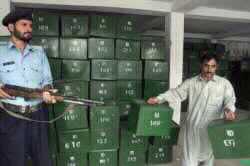Pakistanis Vote to Elect Parliament After 3 Years of Military Rule
10/10/2002| IslamWeb
 Pakistanis vote on Thursday in an election billed as a return to civilian rule, with a new party supporting military ruler Pervez Musharraf against a political mainstream whose exiled leaders are barred from standing. Islamist parties, alienated by Musharraf's support for the U.S-led war on terrorism, are also hoping to make a mark in the first general election since he took power in a bloodless coup in 1999. Musharraf, accused by opponents and rights groups of manipulating the poll to produce a compliant 342-seat national assembly, told the nation on the eve of polling it stood on the threshold of a "new democratic era".
Pakistanis vote on Thursday in an election billed as a return to civilian rule, with a new party supporting military ruler Pervez Musharraf against a political mainstream whose exiled leaders are barred from standing. Islamist parties, alienated by Musharraf's support for the U.S-led war on terrorism, are also hoping to make a mark in the first general election since he took power in a bloodless coup in 1999. Musharraf, accused by opponents and rights groups of manipulating the poll to produce a compliant 342-seat national assembly, told the nation on the eve of polling it stood on the threshold of a "new democratic era".
In an address broadcast on state television and radio, he urged voters, who make up about half the population of 140 million, to "vote diligently" and he promised a free and fair election and a smooth transition of power.
"Another assurance that I want to give you is that I will transfer full executive powers to the prime minister and then I will give up the post of the chief executive," he said.
But in an indication the fine line political analysts say he is treading, he added:
"I also want to say that one power I shall always keep, about which there will be no compromise...is the solidarity and survival of Pakistan and the running of government free from corruption and dishonesty."
The poll coincides with renewed tension with traditional rival India over Kashmir, over which the now nuclear-armed neighbours have fought two of their three wars since independence from Britain in 1947.
Musharraf's pledges were immediately attacked by former Prime Minister Benazir Bhutto, who has been barred from contesting the election in which polling stations open at 8 a.m. (0300 GMT).
His decision to block Bhutto's return to the country, and a series of constitutional amendments enhancing his powers ahead of the poll, have convinced many Pakistanis that he intends to continue to run the country under the guise of civilian rule.
Musharraf enjoys broad support among his people for being seen to fight corruption and imposing political stability after a decade of infighting and squabbling between the main parties which ended in his taking power in a bloodless coup in 1999.
MUSHARRAF UNDER FIRE
But he is under fire from political opponents and independent observers, who accuse him of subverting the restoration of democracy.
Against a background of reports of voter apathy, the turnout will be a key factor to watch. Turnout in the last parliamentary election in 1997 was 34.42 percent.
The U.S.-based Human Rights Watch issued a stinging attack on his record on Wednesday. "In the three years since the coup, Pakistan has witnessed a consolidation of military power rather than a transition to democracy. Pakistan's international partners cannot ignore this fact any longer," it said.
The United States has been slow to mention the controversial build-up to the election, recognising Musharraf as a key ally in the military campaign against the Taliban and al Qaeda network in neighbouring Afghanistan.
Musharraf handed himself the right to dissolve parliament, institutionalised the military's role in politics and imposed laws which prevented Bhutto from returning and the family of another exiled ex-premier, Nawaz Sharif, from running for office.
The changes came hard on the heels of a widely criticised referendum that extended his presidential term for five years.
The military, which has ruled Pakistan for more than half of its 55 year history, is also accused of supporting the powerful Pakistan Muslim League Quaid-e-Azam, dubbed the "King's Party".
That could take precious votes away from Bhutto's Pakistan People's Party (PPP) and Sharif's Pakistan Muslim League (Nawaz), two other big players in Pakistani politics.
Six religious parties joined to form a hardline Islamic coalition in the hope of winning more than the handful of seats they managed in the past, but despite the popularity of their anti-U.S. policies they are not expected to be a major force.
Britain has urged its nationals in Pakistan to be extra vigilant during the election amid fears of an escalation of anti-Western violence by extremist Islamic groups.
The groups, some of them banned by Musharraf, are angry at the government's decision to back the United States against the Taliban in neighbouring Afghanistan and have been blamed for a wave of violence against Western and Christian targets.
Several are linked to Kashmir. Pakistan and India mobilised a million men at their border and came to the brink of war in June, after attacks India blamed on Pakistan-based militants.
Pakistan has rounded up nine men it says were trained by Indian intelligence to disrupt the election with bomb attacks.
Polls close at 5 p.m. (1200 GMT) and first results are expected on Thursday evening.
PHOTO CAPTION
A Pakistani election official carries ballot boxes as a policeman stands guard in Islamabad on October 9. REUTERS/Mian Khursheed
www.islamweb.net
